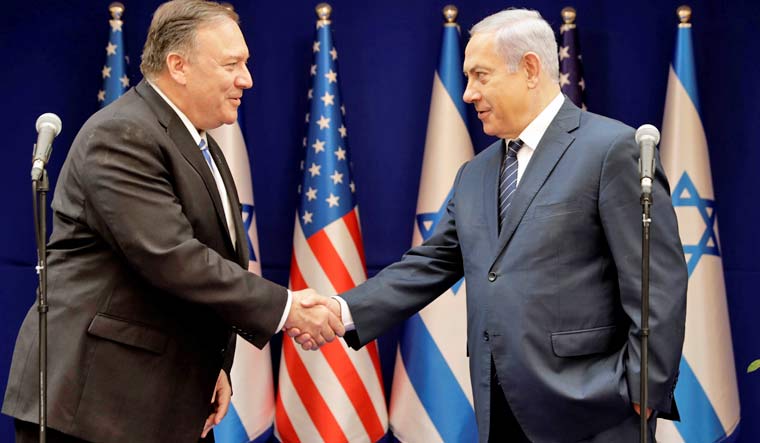US Secretary of State Mike Pompeo arrived in Israel after he and US Vice President Mike Pence negotiated a deal that will see Turkey suspend its Syria offensive but which drew criticism over what many saw as an abandonment of Washington's Kurdish allies.
Pompeo met Israeli Prime Minister Benjamin Netanyahu on Friday as President Donald Trump's policy changes on Syria sparked concern among Israelis.
“Netanyahu and I had a productive meeting on efforts to counter the Iranian regime’s malign influence as well as regional developments and other issues related to Israel’s security,” Pompeo tweeted after meeting with the PM, whose tenure as PM is under threat after the deadlocked elections on September 17. Netanyahu has not been able to form a unity government with his main opponent, ex-military chief Benny Gantz, and could also be indicted for corruption in the weeks ahead.
Washington's top diplomat and the veteran prime minister began the meeting on Friday morning to discuss the same. The duo met at Netanyahu's official residence in Jerusalem.
Pompeo also said that US-Israel relationship has been 'as strong as it has ever been'.
Israelis, on viewing trump's moves in Syria, have been concerned that their country too could be abandoned by its most important ally.
Pompeo further said to reporters present that, “all the efforts we’ve made to push back against the threat not only to Israel but to the region and the world from the Islamic Republic of Iran.”
“We shared our ideas about how we can ensure Middle East stability together, and how we would further our efforts to jointly combat all the challenges that the world confronts here in the Middle East,” he added. Pence further said that Turkey would pause its military invasion to allow the withdrawal of YPG forces from the safe zone that includes a 20-mile-wide area south of the Turkish border in Syria, following which, Turkey would agree to a permanent ceasefire.
Israel has longstanding concerns over whether arch-enemy Iran will move to fill any vacuum in neighbouring Syria, where Tehran has been supporting President Bashar al-Assad in an eight-year-old civil war. Netanyahu, who has had Trump's support on matters like Israel declaring Jerusalem as its capital and their claim to Golan Heights, an area that has been under dispute between Israelis and Palestines, has been careful as to not to criticise President Trump.
Netanyahu has also had tense relations with Turkish President Recep Tayyip Erdogan, a vocal supporter of the Palestinian cause.
Trump issued a statement last saying that Israel strongly condemned Turkey's "invasion of the Kurdish areas in Syria" and that it was"against the ethnic cleansing of the Kurds by Turkey and its proxies."
Trump has received flak from international counterparts for his decision to withdraw troops from northeastern Syria. The act triggered the week-long Turkish offensive against the Kurds, who had fought alongside the US to defeat IS.


